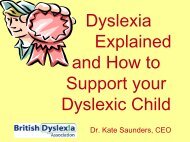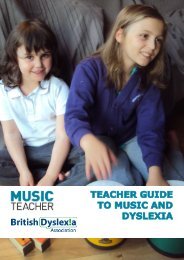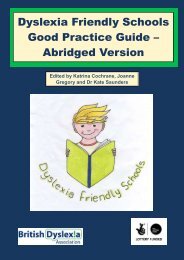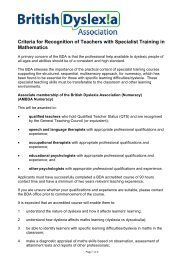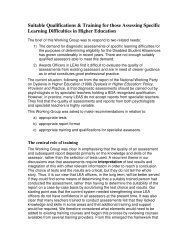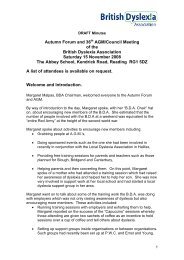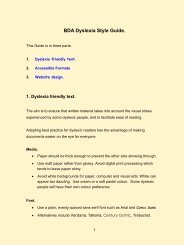Intervention for Dyslexia - The British Dyslexia Association
Intervention for Dyslexia - The British Dyslexia Association
Intervention for Dyslexia - The British Dyslexia Association
You also want an ePaper? Increase the reach of your titles
YUMPU automatically turns print PDFs into web optimized ePapers that Google loves.
<strong>The</strong> remit calls <strong>for</strong> conclusions to be drawn regarding the key questions, and hence<br />
conclusions have been drawn wherever possible, using all the evidence presented.<br />
Undoubtedly there will be other evidence on these issues that might have been included,<br />
but, because of the limitations outlined above, the focus has been on the major strands<br />
of research in the field and with emphasis on studies employing robust methods that<br />
have yielded the most trustworthy scientific evidence.<br />
A key part of the remit was to restrict the review to published evidence. Although the<br />
schools and organisations that provide specialist dyslexia teaching will almost certainly<br />
have data on the progress of their pupils, regrettably very little of this has been<br />
published.<br />
1.1.3 <strong>The</strong> author<br />
Since this is an evaluative review some comment on the qualifications of the author are<br />
appropriate. <strong>The</strong> author is Senior Lecturer in Educational Psychology at the University of<br />
Hull, PhD in psychology, Associate Fellow of the <strong>British</strong> Psychological Society, and a<br />
Chartered Psychologist. In addition, he was director of the Psychological Assessment<br />
Unit at the University of Hull <strong>for</strong> over 10 years. He is also Research Director of Lucid<br />
Research Limited, which develops and publishes educational software.<br />
<strong>The</strong> author has been working in the fields of dyslexia and literacy difficulties as an<br />
academic, published researcher and independent practitioner <strong>for</strong> more than 25 years<br />
and is very familiar with the published literature. As an editor/associate editor of the<br />
Journal of Research in Reading <strong>for</strong> 16 years, he is also accustomed to evaluating<br />
research in these fields. In particular, he has been editor of several special issues of the<br />
Journal of Research in Reading, including ‘<strong>Dyslexia</strong> in Literate Adults’ (1997), ‘Computers<br />
and Literacy’ (2000), ‘Assessment of Literacy’ (2004), ‘Visual Factors in Reading’ (2005,<br />
subsequently published in book <strong>for</strong>m), and ‘New Developments in Literacy and<br />
Technology’ (2009). Other major publications in this context include ‘Computers and<br />
<strong>Dyslexia</strong>’ (Singleton, 1994) and ‘<strong>The</strong> Psychological Assessment of Reading’ (Beech and<br />
Singleton, 1997). He has also co-authored over a dozen computerised psychological<br />
tests that have been published by Lucid Research Limited and which are used in UK<br />
schools and elsewhere in the world.<br />
During the late 1990s the author was chair of the National Working Party on <strong>Dyslexia</strong> in<br />
Higher Education, which was commissioned by Department <strong>for</strong> Education and Skills<br />
(DfES) and the Higher Education Funding Councils <strong>for</strong> England, Scotland and Wales to<br />
investigate and report on policy and provision <strong>for</strong> dyslexic students in universities, and to<br />
make recommendations on good practice. <strong>The</strong> report of that working party (Singleton,<br />
1999) was influential in establishing consistency of good practice in identifying and<br />
supporting dyslexic students across all UK universities.<br />
<strong>The</strong> author was also a member of the DfES working group that developed new national<br />
guidelines on assessment and identification of dyslexic students in higher education,<br />
which came into <strong>for</strong>ce in 2007. He is currently the independent evaluator <strong>for</strong> the ‘No To<br />
Failure’ project that has been carrying out a major intervention programme with children<br />
in 20 schools who were identified as at risk of dyslexia, and which is due to report in the<br />
spring of 2009. <strong>The</strong> author is also currently a member of the Expert Advisory Group on<br />
<strong>Dyslexia</strong> set up by the DCSF to assist Jim Rose in his work connected with the review of<br />
dyslexia provision in schools.<br />
<strong>Intervention</strong> <strong>for</strong> <strong>Dyslexia</strong> 15



